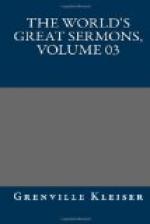3. A third character of Messiah’s administration is righteousness. “The scepter of his kingdom is a right scepter.” If “clouds and darkness are around about him, righteousness and judgment are the habitation of his throne.” In the times of old, His redeemed “wandered in the wilderness in a solitary way; but, nevertheless, he led them forth by the right way, that they might go to a city of habitation.” He loves His Church and the members of it too tenderly to lay upon them any burdens, or expose them to any trials, which are not indispensable to their good. It is right for them to go through fire and through water, that He may bring them out into a healthy place—right to endure chastening, that they may be partakers of His holiness—right to have the sentence of death in themselves, that they may trust in the living God, and that His strength may be perfect in their weakness. It is right that He should endure with much long-suffering the vessels of wrath fitted to destruction; that He should permit iniquity to abound, the love of many to wax cold, and the dangers of His Church to accumulate, till the interposition of His arm be necessary and decisive. In the day of final retribution, not one mouth shall be opened to complain of injustice. It will be seen that the Judge of all the earth has done right; that the works of His hands have been verity and judgment, and done, every one of them, in truth and uprightness. Let us then think not only respectfully but reverently of His dispensations, repress the voice of murmur, and rebuke the spirit of discontent; wait, in faith and patience, till He become His own interpreter, when “the heavens shall declare his righteousness, and all the people see his glory.”
You will anticipate me in enumerating the means which Messiah employs in the administration of His kingdom:
1. The gospel, of which Himself, as an all-sufficient and condescending Savior, is the great and affecting theme. Derided by the world, it is, nevertheless, effectual to the salvation of them who believe. “We preach Christ crucified: to the Jews a stumbling-block, and to the Greeks foolishness; but to them who are called, both Jews and Greeks, Christ the power of God, and the wisdom of God.” The doctrine of the cross connected with evangelical ordinances—the ministry of reconciliation; the holy Sabbath; the sacraments of His covenant: briefly, the whole system of instituted worship—is the rod of the Redeemer’s strength, by which He subdues sinners to Himself, rules even in the midst of His enemies, exercises His glorious authority in His Church, and exhibits a visible proof to men and angels that He is King in Zion.
2. The efficient means to which the gospel owes its success, and the name of Jesus its praise, is the agency of the Holy Ghost.




